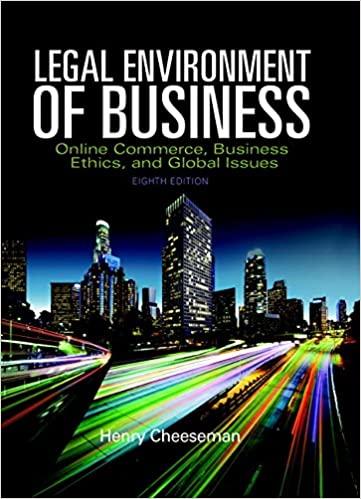Question
REF: How does culture affect ethics? | INTHEBLACK How does culture affect ethics? Is your right and wrong the same as everyone else's? Some schools
REF: How does culture affect ethics? | INTHEBLACK
How does culture affect ethics?
Is your right and wrong the same as everyone else's?
Some schools of thought believe that everyone has their own ethics. This means what is considered right or wrong depends on the time, place, and even the particular preferences or practices of a group of people or individual person.
While we all have our cultural and individual differences, can we also accept that each one of us can choose what is morally right and wrong?
Of course, there are cultural and individual differences. In some cultures, people may think it is wrong to place your elbows on the dinner table, while in others it is totally acceptable. Some people may prefer drinking tea and others coffee. While we should be tolerant and respectful of cultural differences, should we also accept all cultural practices as morally right?
To further explore this issue we need to clarify that normative ethics deals with how we should behave and live our lives, particularly when our actions affect others. However, we do not always, as individuals or societies, do what we should. Looking at specific times and places we can understand why people behave the way they do. This, however, does not mean they should have.
Take slavery, for example. It was legal in the UK until 1833, and in the US until 1865. In Australia, the indentured labour of Indigenous people and South Sea Islanders in the 19th and 20th centuries was akin to slavery. Yet many Europeans at the time saw nothing wrong with it.
Even when we agree that certain behaviours are wrong, they may still be widespread. For instance, bribery is considered wrong and it is illegal in every nation, but in some countries it is very common.
Some people believe ethics is relative. If we accept that everyone can choose what is morally right and wrong, then we cannot and should not evaluate the moral actions of others.
Another view is there is a common morality that applies to everyone, everywhere, at all times. A common morality is based on high-level principles such as respect for people's autonomy and respect for justice. This common morality applies to all specific moral codes, so it allows us to make judgements about all behaviours.
What, then, is the accounting profession's position on moral behaviour? The global acceptance of the Code of Ethics for Professional Accountants would seem to show that, within the profession, there are agreed common moral values, which apply to accountants across the globe.
The International Federation of Accountants (IFAC), created in 1977, represents about 2.8 million accountants in 130 countries, working in public practice, commerce or not-for-profit organisations. CPA Australia was one of its 63 founding member organisations.
IFAC member bodies are obliged to have no less stringent ethical requirements than those of the Code of Ethics for Professional Accountants issued by the International Ethics Standards Board for Accountants (IESBA). In Australia, the Code is incorporated in Accounting Professional and Ethical Standards 110 Code of Ethics for Professional Accountants. It applies to all CPA Australia members, regardless of who they are or where they are working.
While the choice of tea or coffee is yours alone, the Code outlines your ethical responsibilities to your clients and peers.
QUESTION;
What ethical dilemmas was noticed here?
Step by Step Solution
There are 3 Steps involved in it
Step: 1

Get Instant Access to Expert-Tailored Solutions
See step-by-step solutions with expert insights and AI powered tools for academic success
Step: 2

Step: 3

Ace Your Homework with AI
Get the answers you need in no time with our AI-driven, step-by-step assistance
Get Started


